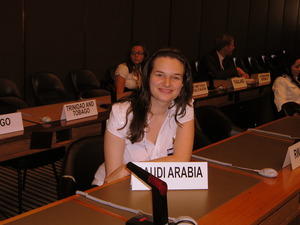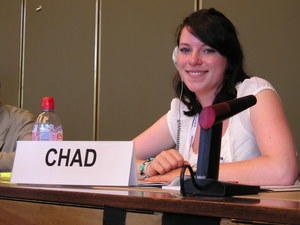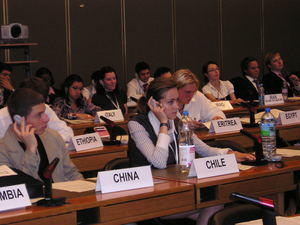Report General Assembly First Committee
Participants from the Freie Universität Berlin:
- Ada Jonusyte representing Chile
- Franziska Weil representing Chad
- Marlene Micha representing Saudi Arabia
Our actual committee sessions in the First Committee of the General Assembly evolved around the topic of the impact of the illicit spread of illegal small arms and light weapons on the achievement of the Millennium Development Goals.
When the conference finally started, we were all aware of the difficulties lying ahead. The topic that had been chosen for the First Committee was challenging but fortunately also highly interesting as we already discovered throughout our research. Due to its complexity, and as in the real United Nations, everyone was splitting up in regional blocs right at the beginning of the committee work (e.g. Organization of the Islamic Conference, OIC; African Union, AU; Rio Group; European Union, EU). Every regional group tried to first negotiate positions and possible commitments within their own regional group before taking propositions to the floor. Yet not everyone could find an agreement within his or her regional block, which was also why there were even more draft resolutions circulating in the end than there were regional groups.
| The Republic of Chad decided to stick with its regional group, the African Bloc throughout the negotiations, even though not all African states had the same opinion on the topic. Keeping in mind Chad’s difficult position as neighbouring Sudan and the Central African Republic, where a crisis erupted and evolved further throughout the conference, the delegate had to ensure that its countries circumstances and interests would be taken seriously. However, due to the diplomatic and professional atmosphere in the committee, the African Bloc managed to find agreeable solutions that all member states could vote in favour of. |
Franziska Weil |
|
Ada Jonusyte |
The Republic of Chile has mobilised the Rio group in order to work together on a draft resolution. As a lot of members of this group also belong to some other groups (like G77) it was not always easy to find the best way between regional and more global aspects of the issue. The Rio group has finally decided that a lot of problems in Latin America are also common to other parts of the world and that we should focus on these points to find a common position together with other regional blocks. This strategy was successful and later on a mediator of the Rio group was able to merge all the draft resolutions into one not forgetting our interests. |
| The Kingdom of Saudi Arabia elaborated a draft resolution within the Organisation of the Islamic Conference, OIC, because the initial proposal to form an Arab League regional bloc was not taken up due to some like-minded states fearing to be excluded from the work of the group. Within the OIC there were major differences how to go about the topic at hand, which stemmed from the fact that Saudi Arabia for instance had made considerable progress, signing international treaties such as the Firearms Protocol designed to tackle the illicit manufacturing of and trafficking in firearms, their parts and components and ammunition, supplementing the Convention against Organized Crime and other states simply wanting to uphold the status quo having a bad record when it came to the fight against the illicit trade of illegal small arms and light weapons. |

Marlene Micha |
Nevertheless, Saudi Arabia successfully convinced the other OIC members to focus in our draft on a model instituted within the Arab League to establish national focal points gathering information in a specific country on how this fight was going and which methods were used and share this information with regional focal points (e.g. Arab League) periodically. Plus, we numerously mentioned the importance of national sovereignty and principle of non-interference in purely domestic affairs (Art. 2 UN Charter). Saudi Arabia remained active in shaping the draft resolution, but nonetheless talked to other delegations from different regional groups so as to be informed about their drafts. This proved to be valuable in the merging process of the different draft resolutions because this way Saudi Arabia (having been selected head negotiator for the OIC) was aware of the major difficulties in other drafts and able to negotiate a compromise, and also to put forward the major initiatives of the OIC proposal. Thus, all national priorities of Saudi Arabia were successfully included in the final draft.
Whether they treated new infrastructure programmes, new funding options or tools for supervision, every draft resolution had certain points to make – which was why we very happy that on the very last day that we managed to finally merge all different drafts into one conclusive document which was accepted by a vast majority in the General Assembly. Along the way there were interesting speeches to follow and to hold and lots of discussions around the different country positions.
In the closing ceremony, Under-Secretary-General Agasako thanked us for our hard work and commitment to GMUN and said he was looking forward to maybe see us soon working as actual diplomats at the UN.
Report General Assembly Fourth Committee (by Christina Tahamtan)


